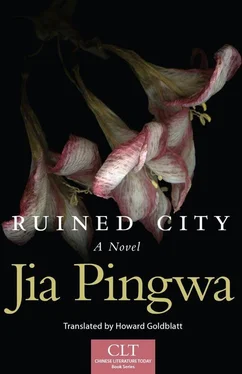“Keep your anger in check,” she said to Zhuang. “Aunty thought Zhou Min was at fault, and he’s crying in the living room.”
“You stay out of this, and keep your mouth shut.”
She slammed the door shut behind her.
After sobbing for a while, Zhou Min decided to go back into the study to cheer Zhuang up.
“Please open the door, Zhuang Laoshi,” he said. “We can talk about what to do next.”
“I’m not going to take all that abuse. What is a secretary-general, anyway? I’m going to write to the mayor.”
“Then write to the deputy governor, too, and I’ll go see him.”
“No, we won’t see anyone. We will wait for instructions from high up. What are you afraid of? I stand to lose more than you do.”
Not daring to say more, Zhou stayed a while longer before leaving for home in dejection.
When she came home that evening, Niu Yueqing walked in to find her mother burning incense in the bedroom, Liu Yue sobbing in the living room, and Zhuang playing his mournful music on the cassette player. The study door was shut, and he would not come out when she called him. She asked Liu Yue what had happened, and after hearing the explanation, she went to knock on the study door again. When the door opened, she launched into a litany of complaints about being kept in the dark about such an important matter. He was a writer, after all, and had been told by the mayor to go to the paper. The politicians were scheming, so what did that mean for her family? She shifted her vilification to the mayor, reasoning that he must have sold them out. Otherwise, how could their adversary know so much? Or could it have been Huang Defu? She ended her tirade by cursing the secretary-general, calling the man a pig and a dog, someone who would wind up in front of a firing squad sooner or later. But she wasn’t quite finished. She lamented how appalling the world had become. You never knew when you might offend someone, she said. It was like carrying a basket of eggs onto the street — you’re afraid of people bumping into you, but they don’t care. She went on and on, calling Jing Xueyin a horrible woman, and railing at her husband for grandstanding. Well, he had gotten more than he’d bargained for.
“Enough already! Stop annoying me,” Zhuang roared as he pounded the sofa. “Are you giving me advice or handing me a rope to hang myself?”
Niu Yueqing was stunned into silence. She and Liu Yue went into the kitchen to make spicy ramen, her husband’s favorite.
. . .
An aspiring young writer had recently made his appearance in Xiliu Lane near the city’s north gate. Looking old for his age, he worked in a factory electrical room. His shift gave him a day off every three days, enough time to run a small business had he wanted to. But he wanted only to write. Few people in Xijing outside Xiliu Lane had heard of him, however, since he had published very little, even though he had used more than a dozen pennames, for all of which he’d had seals carved from Lantian jade by artisans. When his neighbors walked by his window and saw him writing, coughing from his low-quality cigarettes, they mocked him as a typical writer. A few years earlier, he had visited Zhuang, who had recommended his work to the editor at the city paper, an acquaintance of Zhuang’s. Two of the young man’s short stories were published. He went to see Zhuang every couple of weeks, either to pay his respects or to talk, but he was embarrassed to keep going after nothing more of his was published. Over the past two years, a bookseller had been asking him to write something with plenty of sex and violence, and he had written two stories purely for money, the payment for which totaled several hundred yuan. Feeling that he had shamefully compromised himself, he felt even less worthy to pay Zhuang a visit. Later, a relative came in from the countryside to look for work in the city, and spent the night at the writer’s house. Once there, he rode a three-wheeler to Jixiang Village on the south side, where he bought a load of fresh vegetables from a wholesaler and hawked them in the city. He earned at least thirty yuan a day. Seeing how tough life was for the writer, he tried to get the young man to join in, but the writer begged off. After making enough money and several friends, the relative moved into a house on North Ring Road. He continued to sell his goods in the daytime and played cards and drank with his friends at night; soon he had enough money to bring his family in from the countryside. The writer’s wife was so envious of their lifestyle that she constantly berated her husband for his lack of prospects. One day the relative came to see the writer while his wife was haranguing him. The visitor mentioned a government-owned steamed bun shop on North Ring Road; it had been contracted out to someone who had just quit and left the spot vacant. He asked whether the writer was interested. “If you are, I’ll have my wife help you out, and we can consider it a partnership. It looks to be a profitable enterprise. The previous proprietor steamed fifteen hundred catties of buns a day, but we won’t do that much. We can steam between eight hundred and a thousand, enough for us each to net about a thousand a month.”
“I’ll do it,” the writer said. “She nags me so much I can’t write anything at home anyway, but I’ve never steamed a bun before.”
“The place already has a license, and this sort of business requires no connections at government offices. We’ll just sell the buns until we run out. You can continue your shifts at the factory every other night, and my wife and I will steam the buns; you don’t need to know how to do the work. All you have to do is be there.”
So the writer took his bedding to the shop to make it easier to travel between there and the factory, which meant he could stay away from home for ten days in a row.
His change of heart elated his wife, who eagerly hoped he would give up writing so they could have a normal marriage. To her surprise, he came home on the eleventh day riding a three-wheeler loaded with his bedding and four sacks filled with steamed buns.
“We lost money,” he said.
“How is that possible?” she asked. “Everyone else does fine, why can’t we?”
“When you’re born to do something, you can’t change your destiny. You complained when I wrote, but look what we got for five hundred yuan — four bags of steamed buns after ten days of hard work.”
He hadn’t known until he arrived at North Ring Road that his relative had rented a place in a horse-and-wagon shop compound. Vegetable vendors and colliers from the countryside occupied the row of dilapidated buildings; the steamed bun shop was located across from the horse-and-wagon shop. On the day they opened, they used eight hundred catties of flour to steam the buns, which turned out yellow and too hard, because they had used too much baking soda. The vendors refused to buy them, as did the neighborhood residents. When they tried again, using only five hundred catties of flour, they ended up with buns that were still not white enough and were hard as rocks. Why did the same kind and amount of flour produce white, spongy buns at other shops? They went to ask a cook, who revealed the many secrets behind steaming buns, which included adding yeast, powdered laundry detergent, and chemical fertilizer, after which the buns were smoked with sulfur. But he refused to say how much of the extra ingredients to add, and how and for how long to smoke the buns. Though the writer sneaked over to other shops to watch how it was done, when he returned to try a third time, his relative’s wife complained that they would have to sell off what they had already produced in four days or they would lose their investment. Besides, who could be sure that the third time would work? So they went around hawking the buns, but with minimal results. Only the colliers and vegetable vendors bought their buns, and they could only consume so many. The writer suggested that they sell them to a pig farm at twenty fen a cattie, but the relative’s wife could not bear to do that. “If that’s what you want to do, count me out,” she said tearfully. “We’ll split them. I’ll take my share back to the countryside to dry them in the sun and eat over time.” So the young man put in a second five hundred yuan and received four sacks of steamed buns in return. Naturally, that subjected him to another tongue-lashing from his wife, but in the end, they still had to deal with the buns.
Читать дальше


![Matthew Vincent - [you] Ruined It for Everyone!](/books/216429/matthew-vincent-you-ruined-it-for-everyone-thumb.webp)









